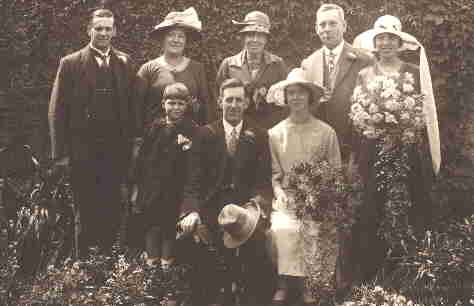Reginald Moss was born in Bristol on 24th May, 1897, the younger son of Alfred Moss, a hot water engineer, and Tinney nee Emmett. Tinney's name is mis-transcribed in some records as 'Fanny' or 'Jenny'.
Alfred & Tinney's marriage apparently wasn't a happy one and by the 1911 census they had separated. The couple came from very different backgrounds (Afred's parents owned their house in Queen Street, Eastville and Alfred was an engineer whereas Tinney's father was an unskilled worker from Clay Bottom, St George).
In the 1911 census Tinney (by then living with just her eldest daughter Elsie) is described as 'an invalid for 13 years'. Reginald and his siblings Frederick and Doris are living with Alfred at his parents house.
There is a family story that the children were neglected and that Tinney was an unfit mother; the implication was that she drank. Her death certificate, in 1918, lists her cause of death as rheumatoid arthritis and endocarditis. It is, in fairness, not possible to know whether she drank as a form of pain relief, or if there were other factors, eg perhaps her illness was seen as an excuse not to actively care for her children.
Growing up in Eastville, Reginald would no doubt have enjoyed the nearby Eastville Park. He may not have been the fittest of boys, but played as goalie for a local team - here he is in 1911.
Reginald and his siblings Elsie and Doris did not enjoy particularly good health. Elsie developed TB and heart problems and died aged just 33, leaving three small sons. Doris had rheumatoid arthritis and diabetes. And when Reginald applied to enlist in the Army in 1915, he was refused on medical grounds. It is possible he may have lived with Type 2 diabetes.
By late 1917, however, with the Third Ypres Campaign taking place in appalling conditions, the need for recruits was urgent and Reginald was accepted into the 8th Battalion of the Gloucesters Regiment. In January 1918 he was sent to France and then to the front at Messines. Just 4 months later, he took part in the Battle of the Lys, also known as the 4th Battle of Ypres. Descriptions of the battle, which began at daybreak on 10th April, show an appalling situation with tired men, trapped in mud-filled trenches and surrounded by exploding shells, rifle fire and occasional gas assaults.
Regardless of the relatively humane conditions of the camp, Reginald's experience of life in the trenches, the appalling loss of life, and the internment must have been incredibly traumatic.
Reginald was discharged from the Army in December 1918 and received a disability pension, possibly due to lung damage, as he is not thought to have been injured. He returned to live with his grandparents at Queen Street, remaining there even after his father remarried in 1920.
After the war Reginald worked for Bristol Tramway as an engineer and later as a bus conductor. His health remained a concern, and with no National Health service at that time, he wouldn't have had easy access to medical support.
In 1920, Reginald's father Alfred remarried to Fanny Holmes Simpson, who he met while working at Carsons Chocolate factory at Siston. Reginald and his future wife Dorothy are standing left in the picture above which also shows Alfred's parents, George Moss 1847-1928 and Fanny Sophia Cater 1850-1933 (seated couple on the left).
Reginald married Dorothy Agnes Burrell in August 1925 after a long courtship (she attended his father's wedding in 1920) and they initially rented a room in Glen Park, Eastville, opposite Dorothy's family home. In late 1939 or early 1940 they moved to a new council home in Abingdon Road, Fishponds with their young daughter Kathleen.
About 1934, day trip to Weston Super Mare.
Sadly Reginald's health deteriorated and he died in August 1940 aged just 43, leaving a widow and a 7 year old child. His death certificate states pancreatic cancer.








No comments:
Post a Comment